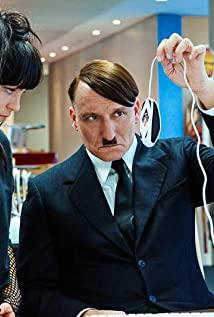In the awards season at the end of last year and the beginning of this year, there was a work that started out insignificant, "Jojo Rabbit", which successfully counterattacked as a dark horse and won many nominations and awards in one fell swoop, including the Oscar for the best adapted screenplay. prize. The New Zealand Maori director Taika Waititi, who is widely known through "Thor 3", directed and personally played "Hitler", one of the protagonists, made the culprit of World War II once again become a joke to be teased. Role.
In fact, Hitler's first comedy image can be traced back to when the Führer himself was still alive. Although the master Chaplin fictionalized a kingdom and a dictator in "The Great Dictator", the discerning eye can see that he is sarcastic and sarcastic at a glance. It was Hitler who was still in his prime at the time. After that, the dignified head of the Third Reich frequently appeared in various spoofs. Even the serious biopic "The Destruction of the Empire" in 2004 was edited by the ingenuity of netizens all over the world. Various ghost videos.
However, in Germany, at least before the new century, the name "Hitler" was still very sensitive. "You must not defend Hitler, and you must not glorify the Nazi government." It was even written into German criminal law. Films including "The Destruction of the Empire" mentioned above were all shot after 2000, and "Meet Hitler" in 2007 was the first Hitler satirical film produced in Germany. Of course, there is also the more famous "Hitler is Back". This film is based on the novel of the same name, but the stage is set in modern times, using a time-travel stalk. Suppose the Führer did not die that year, but woke up on the streets of Berlin in 2014, then what would happen to him and German society reaction.
What was people's first reaction to such a sudden appearance of a fascist demon? Creepy? Can't avoid it? Or attack in groups? But neither. The first to meet him were three football kids who didn't know the big man at all, thinking of him only as an odd, sloppy uncle next door. And when he staggered all the way down the streets of Berlin and walked to the square in front of the Brandenburg Gate, he was seen as a street performer playing cosplay. People laughed and pulled him to take pictures, including a group of Chinese tourists. . He was even recognized as a madman by a mother with a child, and was so scared that he took out the anti-wolf spray and smeared his face. Where is the majesty of the head of state?
The first half of the film is almost filled with embarrassing memes of Hitler's incompatibility with this world, and no one is afraid and no one is angry. This shows from another side that as long as the time is long enough, it is enough to cover up history and memory. In today's popular culture, Nazis often appear in two images, one is a dehumanized existence such as a demon, a careerist, a threat to the world order, etc., and even still appears as a villain in two-dimensional works (such as "Captain America" "); the other is alienated into a symbol of eroticism and aristocracy. Since the 1960s, there has often been an image of a tall, upright, educated and highly civilized Nazi officer, reflecting people's perception of abusers A morbid emotion of both fear and fascination. This kind of admiration for the Nazis has even made some young people put on an illusionary halo for the Third Reich, believing that it is a political system that is full of black technology, friendly to the people, clean and efficient, and constitutes a kind of subcultural circle. It can be seen that no matter which of the above is already a far cry from the real Nazis.
Hitler, who came across, was first taken in by the owner of a newsstand for a few days, where he read a lot of newspapers and learned about the current situation: for example, he was "dead" long ago; Germany ended in defeat in that war; Poland It is still an independent country; and now Germany is led by a chubby woman who is worried and frowning all day long (smile to death). Then, the story came to the first turning point. Fabian, a down-to-earth TV reporter who was about to be laid off, stumbled upon this strange "impersonator" and decided to make him the protagonist. The video material of "Life in Germany" can continue to work on the TV station.
After the continuation of the joke, it has left a big fuss about Hitler's freshness, but made an interesting interpretation of the whole of Germany through the eyes of the Führer. Fabian asked his mother to borrow a car and took him around Germany. Wherever Hitler went, he talked about scenery, life, politics, and immigration with citizens and villagers from all over the world. With jokes and self-deprecation, he went through all the experiences of Germany over the years. The film presents this passage in the form of a pseudo-documentary, with rough techniques and no delicate framing and shots. The seemingly cheap treatment on the surface, compared with Hitler's image of always holding an air, coupled with some German language and cultural stalks, has achieved a special comedy effect.
Fabian gave the material he shot to the TV variety show producer, which really got the other party very interested. As a result, Hitler stepped onto the stage of the talk show as a special guest. As a provocative speaker, impromptu speeches to audiences are not a problem for him at all. In his first appearance, he conquered the audience inside and outside the play with silence, the camera revolved around his dignified face close-up, and the deadly silence of the scene. He still had the same attitude and the same rhetoric, but now the camera brought the face of the national audience to listen to him seriously, and Hitler was immediately different from the previous clown. He pointed out the current shortcomings, talked eloquently, and talked about entertainment programs and the decline of the German spirit. For example, in the paragraph "What kind of country are we living in? The children are poor, the elderly are poor, there is no job, and the birth rate is unprecedentedly low. No wonder, who would let a child be born in such a country? We take ourselves into the abyss, but we don't know it, because on TV people don't see the abyss, but food shows. I will always fight this kind of show Go down until we see that abyss clearly, until we step over it." Really thought-provoking.
As soon as Hitler appeared on the talk show, he quickly became the darling of the media and a new generation of well-known and internet celebrities. He did not hesitate to comment on various sensitive topics. Crazy YouTube Hitler". Interestingly enough, in Hitler's own view, he was speaking seriously about all kinds of problems in Germany, from vulgar TV programs to the government's major policies. The film also uses his subjective lens and inner monologue many times, trying to create a serious atmosphere, borrowing Hitler's vision to pierce the veil of harmony and diversity in current Germany. However, in the eyes of the audience and the media, or in the current society of "entertainment to death", this "Führer" is just a comedy performer who is good at imitating Hitler. The former only cares about whether it is funny or not, while the latter only cares about whether he has ratings or not. Rate. The director calmly demonstrates the horrors of our consumer age, which is so numb and dull that even if Hitler re-emerged in front of the people, we would only use him as an afterthought.
That's not enough, the film takes a second twist. A video of Hitler shooting a puppy while traveling around Germany was exposed, which suddenly awakened people's memory of his devilish side. He was immediately banned, and even the producer was fired from the TV station. But the good times didn't last long. Hitler teamed up with the producer to publish a book and prepare a film, and his popularity was even greater than before. When Fabien finally realized that the person in front of him was not an imitator at all, but the real Hitler, and finally realized that he had opened Pandora's Box, he was powerless. Hitler has become a big star, and even has a group of spiritual followers around him.
The scene at the end of the film is very meaningful. Fabian wanted to kill Hitler on the rooftop, but Hitler, who was shot and fell from the building, did not die, and appeared behind Fabian again. Later, the rooftop and street scenes were restored to the green screen in the studio. It turned out that this was the filming scene of the movie, and Fabian was also played by another actor. More ironically, at the beginning of the film, Hitler, who had just passed through, complained that people now see him no longer salute him. But by the end of the film, when Hitler, the entertainer, passed the street in a convertible, pedestrians took the initiative to give the Nazi salute. Then, the screen switches to the scene of neo-Nazi parades and riots in the real world in recent years, which is self-evident.
It is also true that far-right and neo-Nazis in many parts of the world have never disappeared, not only in Germany. Today, it has spread to five continents, and even unexpected places such as Taiwan and Mongolia can be seen in the directory of the Wikipedia "Neo-Nazism" entry. The resurrection of the Nazis is not a matter of one country, but a global threat. Although specific to each country, the reasons for the birth of neo-Nazis may be different, but similar reasons are also obvious, that is, the post-industrial society faces various crises such as class inequality, racial conflicts, immigration issues, etc. People who have neither economic strength nor the right to speak can only resort to taking the extreme road (this year it is infinitely magnified).
"Hitler is Back" is a comedy, yes, but after watching it, it's hard to laugh. Its purpose is clear: even if Hitler is dead, even if the Nazis are purged, the fanaticism of the past may be revived, and the new Nazis and Hitlers will continue to strangle our minds. People who were easily brainwashed in the age of consumption may not be far from the Nazis who were incited to gather under the swastika flag. As Hitler said in the film - I am part of you, part of all of you.
♑
View more about Look Who's Back reviews











